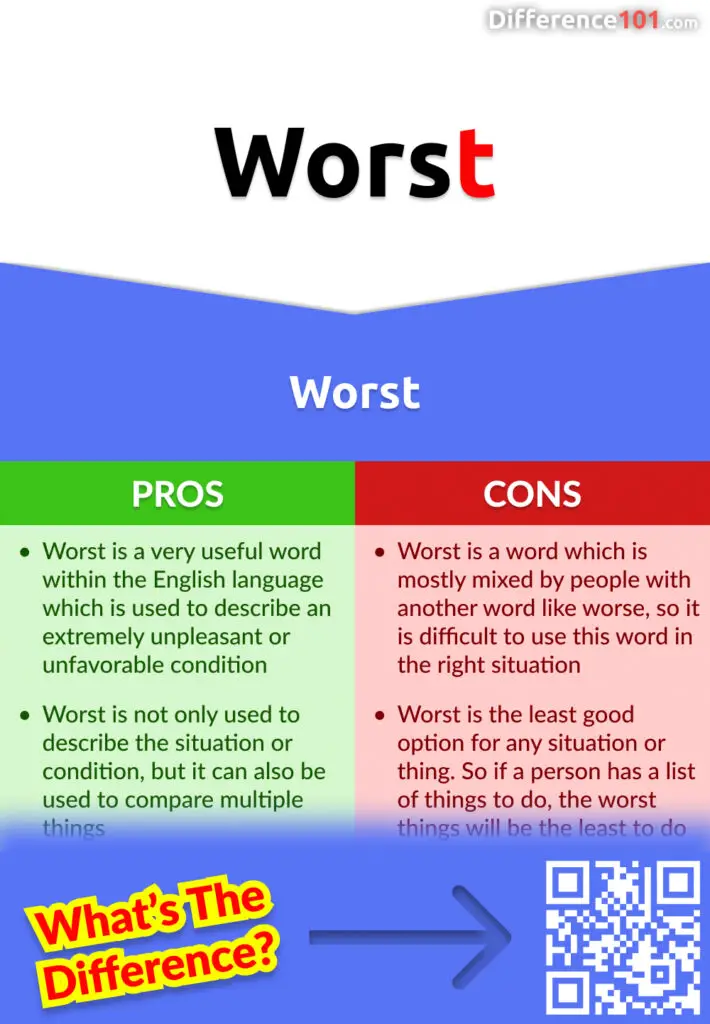Who Was The Worst NFL Team Last Year? Unpacking A Tough Season
Every NFL season brings its share of highs and lows, amazing plays, and, yes, some truly challenging performances. Fans everywhere, you know, often wonder about the teams that just couldn't quite get things going. It's a natural question, really, to ponder who ended up at the very bottom of the standings. We're talking about the team that, in a way, embodied the very definition of "worst" in the league.
When we think about the word "worst," we're talking about something that is of the lowest quality, or perhaps the most unpleasant or difficult experience. My text, for instance, tells us that "worst" means "most corrupt, bad, evil, or ill," and it refers to the "lowest quality, degree, or standard among others in a particular category." So, for an NFL team, being the "worst" means they had the most unfavorable outcome, the most inferior record, or the most difficult time on the field compared to everyone else. It's a tough label, to be sure, but it's one that a team sometimes earns.
This past season, football followers watched many teams battle it out, with some making incredible runs and others facing significant hurdles. Identifying the team with the least success isn't just about pointing fingers; it's about understanding the challenges they faced, the reasons behind their struggles, and what might come next. We'll explore the team that, by record and performance, finished at the bottom of the pile, and perhaps, just perhaps, what that truly means for their future.
Table of Contents
- Identifying the Bottom Dweller
- Why They Struggled: A Closer Look
- What It Means to Be the Worst
- Looking Ahead: The Path to Improvement
- Frequently Asked Questions
Identifying the Bottom Dweller
When you ask, "Who was the worst NFL team last year?", the numbers, quite frankly, speak for themselves. For the 2023-2024 NFL season, the team with the most difficult path, the one that finished with the most losses, was the Carolina Panthers. They concluded their regular season with a record of 2 wins and 15 losses. That, in a way, puts them at the very bottom of the league standings.
This record, you know, clearly shows them as the team that had the least success in terms of games won. It's a stark indicator of a season filled with very, very significant challenges. No other team finished with fewer victories, making their position as the "worst" in terms of win-loss record quite clear.
The Panthers' performance, to be honest, was a consistent struggle throughout the entire season. They faced numerous hurdles, and their record truly reflects the difficult circumstances they endured. It wasn't just a few bad games; it was a season-long battle for consistency and positive results.
Why They Struggled: A Closer Look
Understanding why a team like the Carolina Panthers ended up with such a challenging record requires looking at several key areas. It's rarely just one thing, you know, that causes a team to perform at the lowest quality. Often, it's a combination of factors that compound over the course of a long season.
The term "worst" here, as my text suggests, describes a situation that is "lower quality, less desirable, or less favorable than something else." For the Panthers, this meant many aspects of their play and team structure simply didn't measure up to the competition. We can consider several contributing elements that led to their standing.
Offensive Woes: A Major Hurdle
A significant part of the Panthers' struggle, arguably, stemmed from their offense. Scoring points, you know, is pretty essential in football, and they found that to be a consistent problem. They finished the season at the very bottom of the league in total offense, which is a clear sign of their difficulties moving the ball.
The team's passing game, in particular, faced considerable challenges. They drafted a highly touted rookie quarterback, Bryce Young, with the first overall pick. While he showed flashes of potential, the environment around him, you know, made it very, very tough for him to succeed right away. He lacked consistent protection from the offensive line, and his receiving targets often struggled to create separation or make big plays.
The running game, too, it's almost, didn't provide enough consistent support. While there were individual bright spots, the overall offensive unit just couldn't generate enough explosive plays or sustain long drives. This meant the defense was often on the field for extended periods, putting them under more pressure.
Issues like dropped passes, missed assignments, and turnovers, you know, further hampered their ability to put points on the scoreboard. These kinds of fundamental errors, frankly, can truly derail an offense, no matter how much effort is put in. It's a collective effort, and when one part falters, the whole thing can feel off.
Defensive Challenges and Moments of Resilience
While the offense took much of the spotlight for the team's struggles, the defense also faced its own set of difficulties at times. They had some good individual players, to be honest, but consistency as a unit was a bit of a challenge. They struggled against the run in certain games, allowing opponents to control the clock and wear them down.
There were moments, however, where the defense showed real grit and talent. They kept the team in games that, you know, could have easily gotten out of hand, especially when the offense was struggling to produce. This resilience, in a way, speaks to the effort the players put in, even when the overall results weren't going their way.
Injuries, naturally, also played a part, forcing players into new roles or sidelining key contributors. When you're trying to build a cohesive unit, you know, constant personnel changes can make it very, very hard to find a rhythm. It's a common issue in the NFL, but for a struggling team, it can feel more impactful.
Coaching and Team Dynamics
The coaching situation, it's almost, also saw changes during the season. The head coach was dismissed mid-season, which often signals a team in disarray. Such a move, you know, can be disruptive to team morale and consistency, even if it's meant to spark a change.
New leadership, of course, takes time to implement its vision and build rapport with the players. This transition period, you know, can be particularly challenging for a team that is already struggling to find its footing. It adds another layer of complexity to an already difficult situation.
Team dynamics, basically, also contribute to performance. A losing streak can affect confidence and the overall atmosphere in the locker room. Building a winning culture, you know, requires sustained effort and belief, which can be tough to maintain when losses pile up.
The Impact of Draft Capital
One unique aspect of the Panthers' situation was their decision to trade away their 2024 first-round draft pick to acquire the top pick in the 2023 draft, which they used on their quarterback. This move, you know, was a huge gamble, as it meant they wouldn't have a high pick in the next draft to help rebuild if the season didn't go well.
This trade, in a way, put immense pressure on the 2023 season to succeed, or at least show significant progress. When the team performed at the "lowest quality," as my text describes "worst," it meant they effectively handed over a very valuable asset to another team. This makes the consequences of their "worst" season even more impactful for their long-term outlook.
The lack of a high draft pick, you know, for the upcoming draft means the team will have to be very, very creative and effective in free agency and later rounds to improve their roster. It's a strategic decision that, arguably, amplified the negative impact of their poor performance.
What It Means to Be the Worst
Being labeled the "worst" NFL team, as my text implies, means you are "most inferior, as in quality, condition, or effect." For a professional sports team, this has several significant implications beyond just the win-loss record. It affects everything from fan morale to future team building.
Fan engagement, you know, can take a hit when a team consistently performs at the lowest quality. People still support their team, of course, but the excitement and energy around game days might diminish. It's a challenge for the organization to keep the fanbase energized and hopeful.
For the players and coaches, you know, it means facing constant scrutiny and pressure. They are, essentially, living out the definition of "worst" in front of millions of people. This can be mentally and emotionally taxing, requiring immense resilience from everyone involved.
The perception of the team around the league, basically, also changes. Free agents, for instance, might be less inclined to sign with a team that just had the "worst" record, even if they offer good contracts. It creates a tougher environment for attracting top talent.
Financially, you know, a very, very poor season can impact ticket sales, merchandise, and local sponsorships. While the NFL has revenue sharing, individual team finances can still feel the pinch of a struggling year. It's a complex web of interconnected factors.
Looking Ahead: The Path to Improvement
For any team that finishes as the "worst," the immediate focus, you know, shifts to how they can avoid a repeat performance. The path to improvement is often a long one, requiring careful planning and strategic decisions. It's not just about getting better; it's about fundamentally changing the trajectory.
One key area for improvement is personnel. This means making smart decisions in the draft, even without a top pick, and being strategic in free agency. Acquiring players who fit the team's scheme and culture, you know, is very, very important. It's about building a roster that complements each other.
Coaching stability and development are also crucial. A consistent coaching staff can help implement a clear vision and allow players to grow within a system. This continuity, you know, often leads to better performance over time. It's about giving everyone a chance to settle in.
Player development, especially for younger players like their rookie quarterback, will be paramount. Giving them the resources and support they need to improve, you know, is essential. This includes everything from coaching to training facilities and off-season programs.
Ultimately, for the Carolina Panthers, turning things around will require a collective effort, a clear strategy, and a bit of good fortune. The goal, naturally, is to move far away from the "worst" label and start climbing the standings. It's a long road, but one that every team at the bottom hopes to travel successfully. You can learn more about team building strategies on our site, and link to this page for more NFL insights.
Frequently Asked Questions
Here are some common questions people often ask about the "worst" NFL teams.
What is the worst NFL record ever?
The worst NFL record in a single season, you know, belongs to the 2008 Detroit Lions, who went 0-16. That was a truly difficult season for them, and it stands as a unique low point in league history. It's a record no team wants to achieve, naturally.
How is the "worst" team determined in the NFL?
The "worst" team, in terms of standings, is determined by the team with the fewest wins in the regular season. If there's a tie in wins, you know, then tie-breaking rules based on strength of schedule or head-to-head records might come into play, though typically the team with the outright fewest wins holds that title. It's pretty straightforward, actually.
Does the "worst" team get the first pick in the NFL Draft?
Yes, the team with the "worst" record from the previous season, you know, generally receives the first overall pick in the next NFL Draft. This system is designed to help struggling teams improve their rosters by acquiring top college talent. It's a way, in some respects, to balance the playing field over time. For more information, you could check out the official NFL Draft rules on their website, for example, at NFL.com Draft Tracker.

Worse vs. Worst: 7 Key Differences, Pros & Cons, Examples | Difference 101

The Top 5 Worst Fast Food Sandwich Chain Restaurants in America

Worst Cooks in America - Rotten Tomatoes